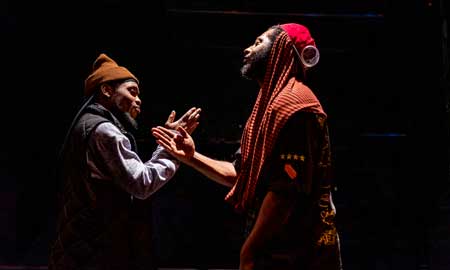Play, Performance (2018)
by Antoinette Nwandu
Directed by Monica White Ndounou
Speakeasy Stage Company
Boston Center for the Arts, South End, Boston
January 3 – February 2, 2020
With Kadahj Bennett (Moses), Hubens “Bobby” Cius (Kitsch), Lewis D. Wheeler (Mister/Ossifer)

Kadahj Bennett as Moses
in “Pass Over”
Two young black men, Moses (Kadahj Bennett) and Kitsch (Hubens “Bobby” Cius), are entrapped in a prison, more allegorical than realistic, but vividly horrid. They grapple with continued fears about survival, and dignity, haunted frequently by a lordly plantation owner and a prison cop (Lewis D. Wheeler).
More of a scream than a narrative, this play actually functions more like a theatrical performance piece. Without a story per se, it features its two characters constantly grappling with their mutual fate as endangered and threatened young black men. How they deal with this – through their approaches to one another, to the outer world, and to the threat of the omnipresent white overlords, forms the basis for its durable and constant expression of grief, Frustration, and rage.
Suzan-Lori Parks’ Pulitzer Prize winning play Topdog/Underdog (2001) is a play that features two embattled black brothers who are pitted against one another by an overriding system that undermines their capacity for genuine brotherhood. Parks’ narrative is finely crafted and ultimately provides the context for the tragic developments that frame the personal and social dilemmas of its characters.
Nwandu’s play is less structured than Topdog/Underdog; in fact, it appears to have very little dramatic structure, save for the introduction of the white overlord/policeman and the varying attempts of the two main characters to escape their confines and their fates. The minimization of narrative makes for greater focus on the music, such as it is, of the dialogue, peppered constantly with mutual references by the characters using the “N” word. That focus provides the central impetus of the play, which appears to be a form of tragic mutual derision by both characters created by the enveloping injustice that forms their world.
Set in an allegorical prison, the characters scrape and beat at one another, desperate to break out and not knowing how. The fervor with which they twist, roll and bend against one another and the omnipresent enemy is urgent and palpable.
The narrative that most comes to mind as a kind of analogue is a very different one in some respects: Alan Ginsberg’s ferocious poem from the late 1950s, Howl, inspired by rage against a society that put Bohemian gays into tragic and destructive conflicts.
Playwright Nwandu was on hand after the show for a talkback and indicated that she was inspired to write the show during the time when young black Trayvon Martin’s murderer, George Zimmerman, was being tried and exonerated in a Florida courtroom. She also indicated a need to break out of traditional playwriting modes in order to release her most honest energies for the writing of this play.
The result is an intense and ferocious performance piece, given a nonstop production by the two energetic principals, Kadahj Bennett as Moses, and Hubens “Bobby” Cius as Kitsch. Lewis D. Wheeler offers chilling and effective support as the white overseer and policeman.
– BADMan (aka Charles Munitz)
Leave a Reply